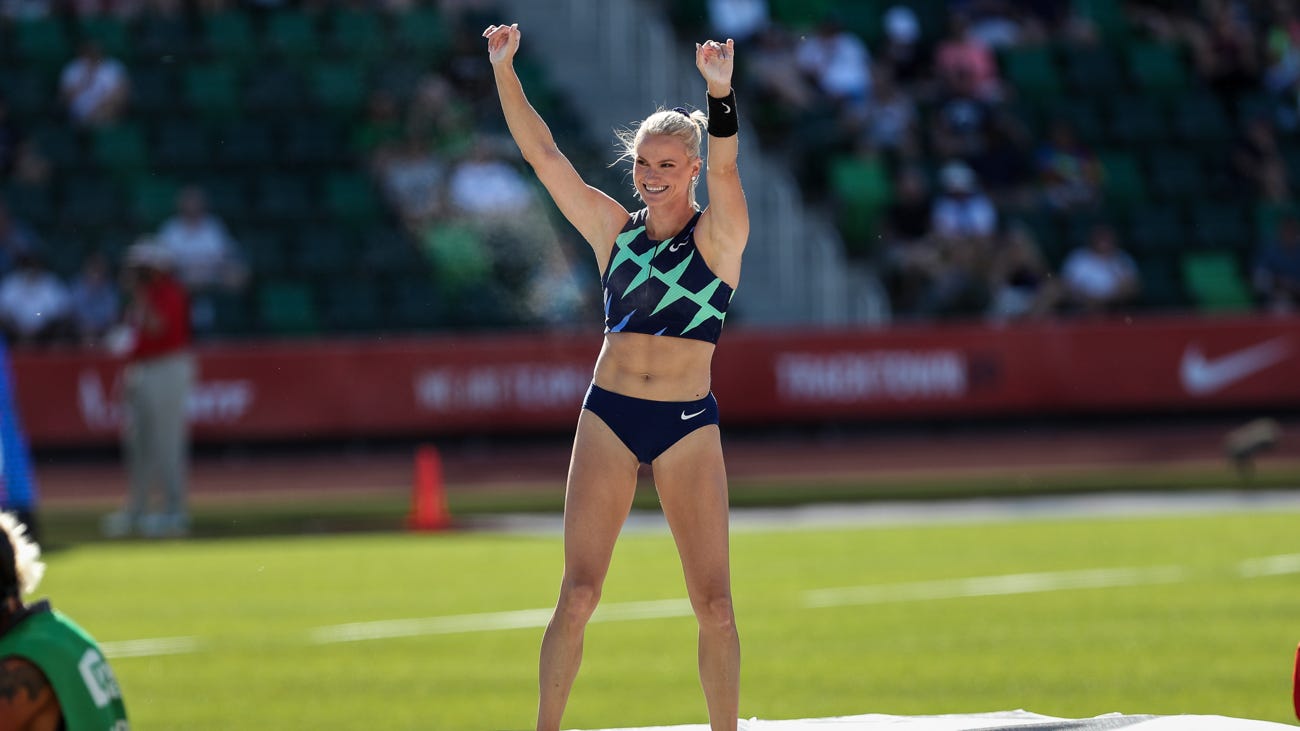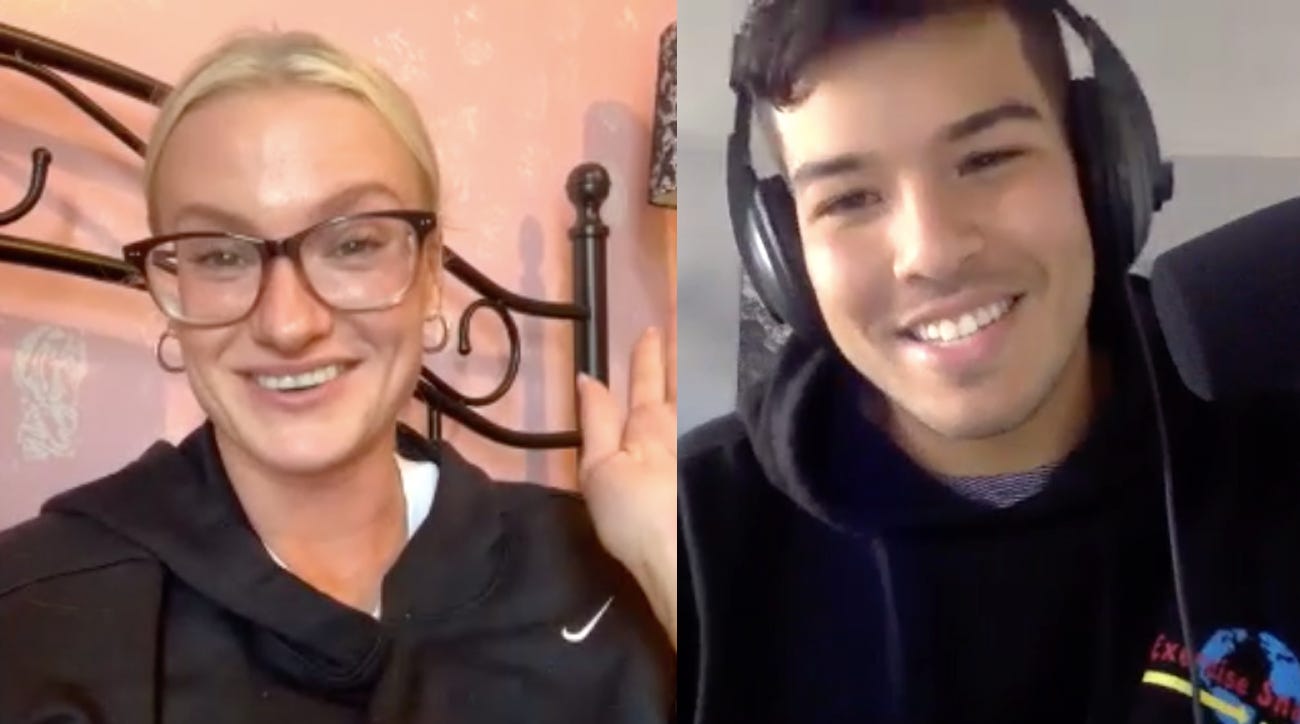Interview: How Katie Nageotte Became An Olympic Champion By Leaving Her Comfort Zone
After finishing fifth at the Olympic Trials in 2016, Katie Nageotte's gut told her to reach out to coach and 2007 world champion Brad Walker to make some changes.
This is the CITIUS MAG Newsletter by Chris Chavez. If you’ve been forwarded this email or stumbled upon a link online, you can sign up and subscribe here:

Katie Nageotte is the Olympic gold medalist in the pole vault. She is one of three American women to take gold in the event at the Games since it was added for them in 2000. In this episode, there's plenty of Ohio talk because if you've followed her on social media she's been parading around the medal all over Cleveland. The Olmsted Falls native has thrown out the first pitch at the Cleveland Indians game, given a pep talk at the Browns practice and been honored by state officials. We discuss her journey and success at Ashland University at the Division II level and what pushed her to keep going as a professional pole vaulter.
As a pro, she finished 5th at the U.S. Olympic Trials in 2016 which led her to make a change and team up with Brad Walker as her coach. Over the past five years, she saw major improvement under the 2007 world champion's guidance. She made the 2018 World Indoor and 2019 World outdoor teams. A major breakthrough happened in 2020 and 2021 that suddenly made her the Olympic gold medal favorite.
In our conversation, she discusses how that all happened and how she managed the pressure.
We also touch on how she missed on her first two tries at 4.50m at the Tokyo Olympics – as if there was any need for any extra added pressure. However, managed to turn it around and ended up winning with a 4.90m clearance.
Listening to her recounting her experience in Tokyo is pretty thrilling so I hope you enjoy it. You can now listen to our conversation on The CITIUS MAG Podcast. Catch the latest episode of the podcast on Apple Podcasts. We are also on Stitcher, Google Play and Spotify.
I’ve transcribed a few parts of the interview below, which have been edited lightly for clarity.
On what if in 2016 someone would have told her that she would be the Olympic favorite five years later.
“I would’ve loved to have believed them…At the time I would’ve been like, ‘How?’ Because I wanted to do that so how did I get there. If I’ve learned anything from this sport it’s that you just can’t want it more than the next person...It takes a lot to get out of your comfort zone, especially in the pole vault. Because it is scary and because there is a fear element, you want to hold onto your comfort zone so badly. I’m sure there’s an element of that in running. When you’re running down with a pole in your hand, you want to trust it.
Changing things really is not easy. There were a lot of tears. I always bought in. My gut led me to Ashland. My gut sent me to Brad. It hasn’t been wrong yet. I knew that I was in the right place because of the way he described it. He made it so simple. I’m in control of what I’m doing so if I focus on X, Y and Z, the heights will come. He totally changed the mental game for me, which then allowed me to change the technical things. It took all of that time to make that happen. Especially in this generation, people want immediate gratification and results. I’m very much like that. I don’t like waiting for things. I’m really happy that I didn’t make the team in 2016 because I would not have done that. I would not have gone that far out of my comfort zone. I wouldn’t have let someone else challenge me that way. I’m grateful that I took the leap and my gut led me to where it is.”
On her progression over the past five years
“I have always felt that I love my career path as much as I didn’t like it in the moment because I saw people like Sandi (Morris) have success immediately. She came out of college, signed with Nike and won an Olympic medal the next year. Everything took off for her immediately. I was like, ‘Why isn’t this happening for me? I feel like I’m putting in all this work.’ It took me to Brad. Going through what I did allows me to not go through that again. I know other athletes – I’m not saying this is Sandi – but who have success immediately and then deal with some issues later in their career. I don’t think I will have the same thing and it will help with the longevity of my career because I had to fight and battle my way to this point. I still think there are things technically that we’re working on and can improve upon. It’s definitely needed to be the way that it went for me to have this success now.
But, yeah. It was fun being the underdog because there wasn’t as much pressure. Going into this Olympics, there was some pressure of course because I was having a great year but I’ve seen some articles that said I was an unexpected win. If you followed this year, maybe not but if you’re just following on paper the past years, then yes I would be an unexpected win. It definitely leaned to having more fun with it. Of course, I was nervous.
In 2020, we were able to keep training thankfully. That helped me because it kept me motivated that Sandi was still the favorite and all these other women were doing so well but I had the potential to jump higher. It helped immensely.”
On missing her first two jumps of the Olympics
“I think I went numb at one point. It’s pretty much the worst feeling and nerves. I don’t do that. Not to sound cocky but Brad and I got really dialed in on how to make that first bar as consistent as possible. Warmups help that. Warmups tell you what you need to know like that’s the pole you get on and we’ve eliminated a lot of variables in the way we compete. My warmup wasn’t great because my quad on my takeoff leg was so tight that it kept grabbing and cramping. No matter how much I massaged it or stretched it, everything I did would just do a slow and aggressive grab before releasing it. It was the closest I’ve ever felt to it tearing. I was so excited coming in. I was so confidently felt like I could win and then that happens. You’re only as good as your body holds up so I was really nervous after and during the warmups. I took a lot of trips down the runway that weren’t very good jumps. I was just trying to get the quad to loosen up and it did toward the end. Now I’m nervous. I had a lot more anxiety than I should have. Those first couple jumps were the combination of the nerves but also jumping off the quad…That was why those happened. Before the third attempt, I was thinking, ‘Just jump. Jump off the ground like you never have before. Jump through that space and just go.’ It still didn’t feel great on the third attempt and I still felt that something was off but it was better. As the competition went on, I found my rhythm.”
How she remembers the winning jump
“You know as you’re going over and coming down on the backside like, ‘I did not touch that.’ I didn’t see it but I knew I didn’t touch it so I knew it was a make. It’s just this moment of pure elation and excitement. That’s why I love the pole vault action shots. We don’t have time to calculate our reaction or plan what our face is going to look like. It’s just pure emotion and it’s as good as it gets. I was pretty ecstatic. I think part of it too was I was so excited since when I took off the ground I really thought I messed it up. I really thought it was a bad attempt. I have never cleared a bar feeling that way – let alone that high of a bar feeling that way. My coach said I was so far under that the pole just scooped me up and shot me up.
What’s funny is that Brad told me that during his American record attempt, he thought it was a bad attempt. His favorite jump was earlier in the competition that day. That always floored me because I wondered how you can have a bad jump and clear the American record. That makes no sense. It always stuck with me with a message of finishing every jump and giving myself a chance and committing to it no matter how it feels.
In this sport, we want perfection so a lot of times when it feels bad, we just shut down the jump or we’ll bail on it…That was the first thing that came to mind and I was like, ‘Holy crap.’”
For more from Katie, be sure to listen to the full episode on the CITIUS MAG Podcast.
SUPPORT THE PODCAST
Subscribe and leave a review on Apple Podcasts. We just surpassed 1,000 reviews and this helps new people discover the show on the top charts! This takes 30 seconds to do.
You can pledge any monthly support for us on Patreon or give a one-time donation by shooting us anything on Venmo – @CITIUSMAG. Your assistance helps us plan for future events like the fall marathons and next year’s world championships in Eugene, Ore. We also just hired a podcast producer, who is helping with the show!
Pick up merch from the CITIUS MAG store to show your support for the podcast and website.
That’s it from me in the latest edition of the CITIUS MAG Newsletter. As always, thank you for reading! If you enjoyed this, learned something new or have any questions or commentary on anything featured in this issue, feel free to hit my inbox by replying or writing to chris@citiusmag.com





